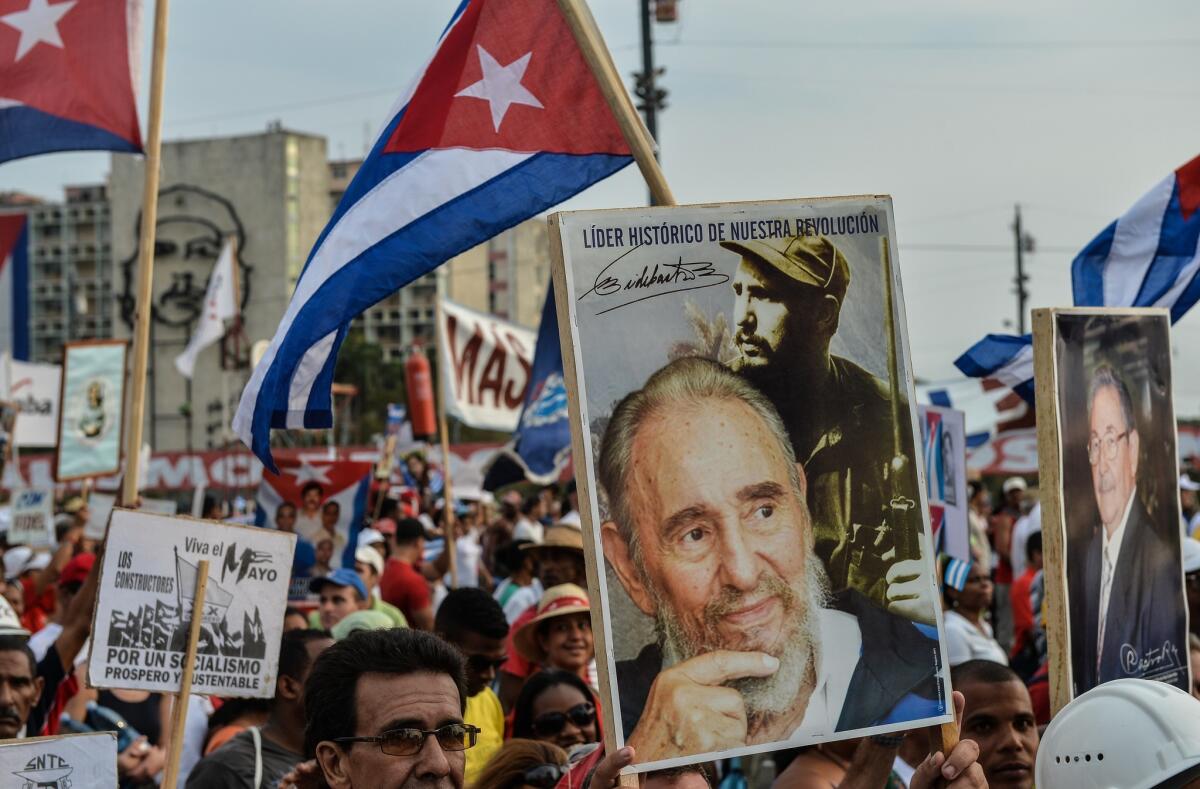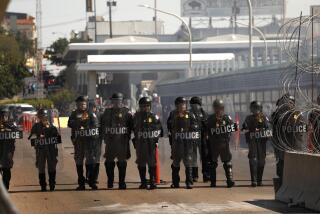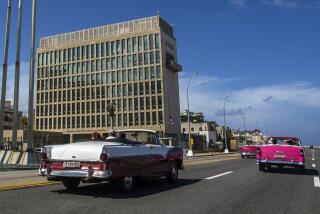Political calculus keeps Cuba on U.S. list of terror sponsors

Cuba’s communist leadership was quick to send condolences to the victims of the Boston Marathon bombings and to reiterate to Washington that it “rejects and condemns unequivocally all acts of terrorism.”
Once a key supplier of arms and training to leftist rebels in Latin America, the Castro regime long ago disentangled itself from the Cold War-era confrontations. Havana now hosts peace talks between the Revolutionary Armed Forces of Colombia that it once supported and the U.S.-allied government the insurgents battled for years.
Havana still gives refuge to a few fugitive radicals from the Black Panthers and Basque insurgents, and two years ago a Cuban court convicted 64-year-old development specialist Alan Gross on spying charges for attempting to install satellite equipment without government permission.
But nothing that Cuba has done suggests its government is plotting harm against Americans, national security experts say. And they criticize as counterproductive the State Department’s decision, disclosed this week, to keep Cuba on its list of “state sponsors of terrorism.”
“We ought to reserve that term for nations that actually use the apparatus of statehood to support the targeting of U.S. interests and civilians,” said Juliette Kayyem, a former assistant secretary for intergovernmental affairs at the Department of Homeland Security and now writing and lecturing on national security in the Boston area. “Yes, Cuba does a lot of bad things that we don’t like, but it doesn’t rise to anything on the level of a terrorist threat.”
On Wednesday, State Department spokesman Patrick Ventrell said the administration “has no current plans to remove Cuba” from the list to be released later this month. The island nation that has been under a U.S. trade and travel embargo since shortly after revolutionary leader Fidel Castro came to power in 1959 is in the company of only Iran, Syria and Sudan in being branded with the “state sponsor” label.
Kayyem laments the “diluting” of the terrorist designation based on political or ideological disputes.
“We work with a lot of countries we don’t like, but the imprimatur of ‘terrorism’ has a ring to it in a way that can be harmful to us,” she said.
Collaboration between the United States and Cuba on emergency planning to respond to the mutual threats posed by hurricanes, oil spills and refugee crises are complicated by the set of trade and financial restrictions that comes along with the “state sponsor” censure, Kayyem said.
“There are some real operational impediments when we have a system that begins with ‘no’ rather than ‘why not?’ ” she said of the legally encumbered contacts between Havana and Washington.
Politicians who have pushed for a continued hard line against Cuba cheered their victory in getting the Obama administration to keep Cuba on the list. U.S. Rep. Ileana Ros-Lehtinen, a South Florida Republican whose efforts to isolate and punish the Castro regime have been a central plank of her election strategy throughout her 24 years in Congress, hailed the State Department decision as “reaffirming the threat that the Castro regime represents.”
Arash Aramesh, a national security analyst at Stanford Law School, blamed the continued branding of Cuba as a terrorism sponsor on politicians “pandering for a certain political base.” He also said President Obama and Secretary of State John F. Kerry have failed to make a priority of removing the impediment to better relations with Cuba.
“As much as I’d like to see the Castro regime gone and an open and free Cuba, it takes away from the State Department’s credibility when they include countries on the list that aren’t even close” to threatening Americans, Aramesh said.
Political considerations also factor into excluding countries from the “state sponsor” list, he said, pointing to Pakistan as a prime example. Although Islamabad “very clearly supports terrorist and insurgent organizations,” he said, the U.S. government has long refused to provoke its ally in the region with the official censure.
The decision to retain Cuba on the list surprised some observers of the long-contentious relationship between Havana and Washington. Since Fidel Castro retired five years ago and handed the reins of power to his younger brother, Raul, modest economic reforms have been tackled and the government has revoked the practice of requiring Cubans to get “exit visas” before they could leave their country for foreign travel.
There was talk early in Obama’s first term of easing the 51-year-old embargo, and Kerry, though still in the Senate then, wrote a commentary for the Tampa Bay Tribune in 2009 in which he deemed the security threat from Cuba “a faint shadow.” He called then for freer travel between the two countries and an end to the U.S. policy of isolating Cuba “that has manifestly failed for nearly 50 years.”
The political clout of the Cuban American community in South Florida and more recently Havana’s refusal to release Gross have kept any warming between the Cold War adversaries at bay.
It’s a matter of political priorities and trade-offs, Aramesh said. He noted that former Secretary of State Hillary Rodham Clinton last year exercised her discretion to get the Iranian opposition group Mujahedeen Khalq, or MEK, removed from the government’s list of designated terrorist organizations. That move was motivated by the hopes of some in Congress that the group could be aided and encouraged to eventually challenge the Tehran regime.
“It’s a question of how much political cost you want to incur or how much political capital you want to spend,” Aramesh said. “President Obama has decided not to reach out to Cuba, that he has more important foreign policy battles elsewhere.”
ALSO:
In China, rat meat is sold as lamb
U.S. military plane crashes in Kyrgyzstan
Small growth for Mexico’s economy in first quarter of 2013
A foreign correspondent for 25 years, Carol J. Williams traveled to and reported from more than 80 countries in Europe, Asia, the Middle East and Latin America.
More to Read
Sign up for Essential California
The most important California stories and recommendations in your inbox every morning.
You may occasionally receive promotional content from the Los Angeles Times.











